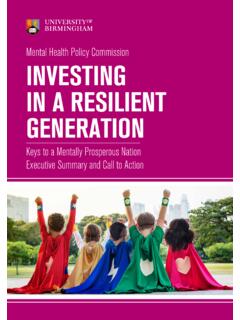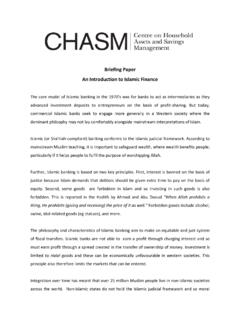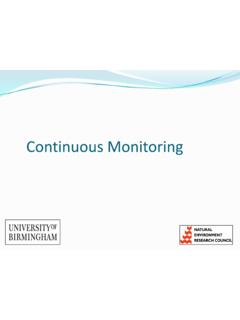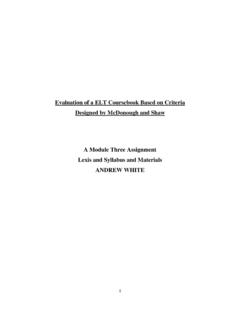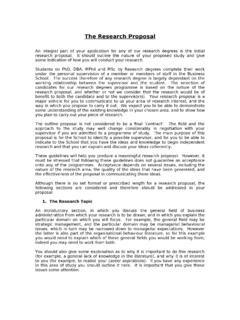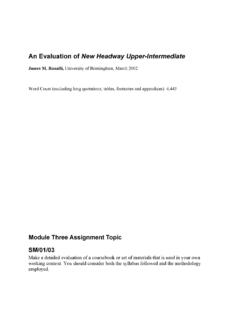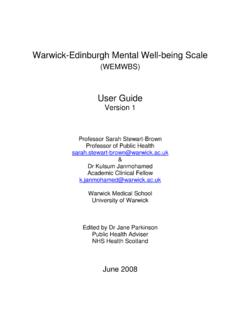Transcription of Guidance on promoting mental health and wellbeing (PDF)
1 The University of Birmingham Guidance ON promoting mental health AND wellbeing October 2010 2 3 Foreword promoting mental health and wellbeing has been produced by the University s wellbeing Advisory Group (WAG). WAG s membership includes academics and professionals from across the University as well as Trade Union representation. In developing this Guidance WAG also worked with representatives from the Guild of Students. The intention is that this Guidance is used to promote mental health awareness across the University. It outlines the arrangements that are in place to support staff and students who experience emotional distress and mental health difficulties. It also provides practical advice as well as information about resources that are available inside and outside the University.
2 Drawing on good practice that has been developed in the Higher Education sector this Guidance supports the University s aim to create an inclusive community, which promotes diversity and equality of opportunity for everyone. promoting mental health and wellbeing also reflects the view of the Universities UK/Guild HE Committee for the Promotion of mental wellbeing in Higher Education that Effective mental health promotion involves not only attending to the needs of those with mental health difficulties, but also promoting the general mental wellbeing of all staff and students, which will in itself bring significant benefits to the HE institution . (UUK/GuildHE:2006:2) Professor Ann Davis, Director of the Centre of Excellence for Interdisciplinary mental health (CEIMH) and Chair of WAG.
3 October 2010 4 5 Guidance ON promoting mental health AND wellbeing The University of Birmingham aims to: Create an inclusive community, which promotes diversity and equality of opportunity for everyone Provide all members with a welcoming secure and supportive environment Implement strategies that promote equality and that work towards reducing and eventually eliminating discrimination (Fairness and Diversity Policy) This publication provides Guidance about how these aims can be realised in relation to the mental health and wellbeing of students and staff. Evidence suggests that in the University s community of over 36,000 students and staff emotional and mental health difficulties will be experienced by at least 9,000 people each year.
4 These difficulties will range from temporary experiences of emotional distress, emerging conditions of mental ill health and ongoing conditions that require treatment and support. The purpose of this document is to build on the University s commitment to Equality and Diversity by providing Guidance that will enable members of the University to play their part in: Creating an inclusive environment and culture in the University that positively promotes the mental health and wellbeing of students and staff. Providing the support required for students and staff with mental health difficulties to achieve their full potential through a range of accessible resources and services. Ensuring that all employees and students who experience mental health difficulties are treated fairly, sensitively and with respect, and are offered the support that they require.
5 6 Ensuring that the University meets its legal obligations with respect to individuals whose mental health difficulties are recognised as a disability under the Disability Discrimination Act. KEY DEFINITIONS promoting mental health and wellbeing : in this document this phrase is used to refer to ways of working at all levels of the University which seek to both: reduce unnecessary stressors on staff and students through creating positive learning and work environments. provide the support needed by those with mental health difficulties which will enable them to achieve their full potential. For more information about mental health Promotion in Higher Education for students visit: and for staff visit: and mental health difficulties: throughout this document this term is used to refer to two groups of individuals: (a) those who experience such emotional distress that their ability to undertake expected tasks is reduced.
6 Emotional distress of this kind can be the result of a number of causes. It could be a temporary reaction to a painful or frightening event or experience. It could be a reaction to being under sustained pressure. It could be the result of factors such as using drugs, a lack of sleep, a change in diet or a physical illness. Sometimes it is an early indication of the beginnings of a sustained period of mental distress. (b) those with a recognised psychiatric condition for which they may, or may not, be receiving medical or psychological treatment. Such individuals find that difficulties usually arise when their condition becomes unstable in some way and symptoms recur, which may be the result of external factors or changes in response to treatment. Individuals in each of these groupings may require support to enable them to participate fully in higher education as employees and students.
7 Psychiatric condition: is used in this document to refer to a condition which has been either diagnosed as a mental illness or behaviours which 7 are of sufficient severity to be identified within one of the commonly accepted psychiatric categories. For more information about psychiatric conditions see the set of leaflets available at: Key Issues mental health and wellbeing is an issue for all University employees and students. It is important to recognise that most of us experience mental health difficulties at some points in our lives and often these are typical reactions to particularly stressful circumstances. It is when these difficulties are severe and enduring that there is a negative impact on our capacity to function well as employees and as students.
8 Many individuals with recognised mental health difficulties have effective coping strategies and support already in place; they may not need or wish to seek adjustments or additional support. Always remember that not all individuals experiencing difficulties, even relatively severe, need any special action to be taken as long as they are part of a community in which they can find the following: Understanding and sensitivity Tolerance of difference An awareness by others of the activities which might heighten their anxiety A climate of acceptance by others For more information about how to create working and learning environments at the University that promote mental health and wellbeing visit: and 8 THE UNIVERSITY HAS LEGAL DUTIES IN RELATION TO STUDENTS AND EMPLOYEES WHO HAVE mental health DIFFICULTIES.
9 The Disability Discrimination Act (1995) defines disability as a physical or mental impairment which has a substantial and long-term adverse effect on the ability to carry out normal day to day activities . In the HE context this has a number of implications: (a) It is unlawful for any University policies, procedures or practices to discriminate against someone because he/she has a mental health problem. For more information visit the Commission for Equality and Human Rights: and the Equality Challenge Unit: (b) The University is required to make reasonable adjustments to enable students and staff experiencing mental health difficulties to undertake their studies/duties. Advice on what this constitutes for students can be obtained from the Disability and Learning Support Service and for staff from the Employee Disability and Additional Needs Adviser or Occupational health .
10 (c) Students experiencing mental health difficulties are eligible to apply for Disabled Students Allowance (DSA) to provide practical assistance to aid them in their studies. For more information visit: (d) Staff experiencing mental health difficulties may be eligible to apply for Access to Work (AtW). This programme offers practical advice and help to employees and employers which may include a grant towards the approved costs that arise because of an individual s disability. For more information visit: Ensuring confidentiality is key to encouraging individuals to seek and use support when they need it. There is still a considerable stigma attached to seeking help for mental health difficulties. All those involved in providing advice, support and Guidance in relation to mental health difficulties must be clear about their duties in this area and vigilant about delivering on them.
